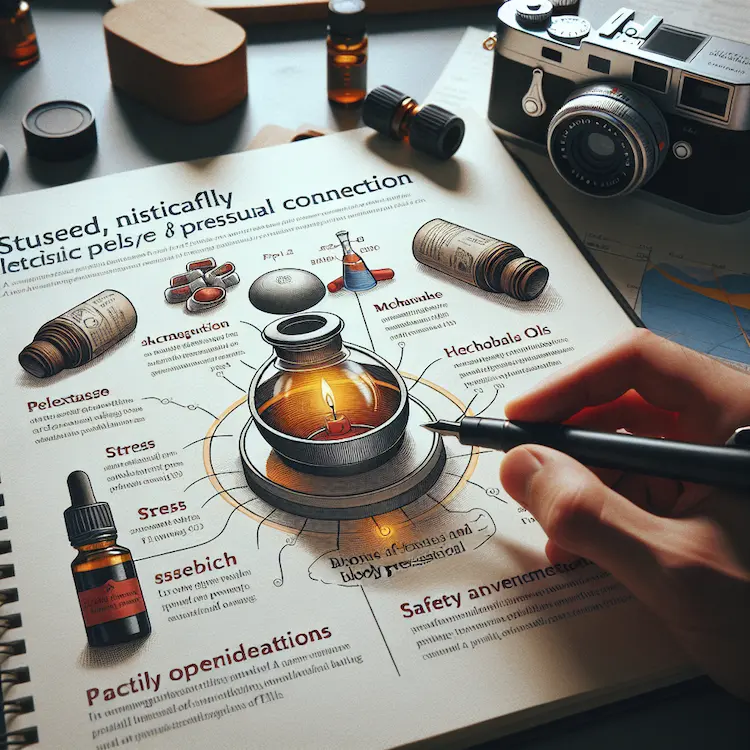Aromatherapy, the practice of using essential oils for therapeutic purposes, has gained significant attention for its potential benefits in promoting relaxation and managing blood pressure. This ancient healing art has found its place in modern wellness routines, offering a natural complement to traditional medical approaches. Let’s explore how aromatherapy can be a valuable tool for stress reduction and blood pressure management.
Understanding Aromatherapy and Its Effects
Aromatherapy involves the use of plant-derived essential oils to promote physical and psychological well-being. These concentrated extracts are typically inhaled or applied topically, allowing their active compounds to interact with the body’s systems.

Stress and Blood Pressure Connection
Stress and high blood pressure are closely intertwined. When we encounter stressful situations, our bodies release hormones like cortisol, which can temporarily increase blood pressure. Chronic stress may lead to sustained high blood pressure, increasing the risk of cardiovascular health issues.
How Aromatherapy Works
Essential oils are believed to influence the limbic system, the part of the brain responsible for emotions, behavior, and long-term memory. When inhaled, the volatile compounds in essential oils can trigger various physiological responses, including relaxation and stress reduction.
Essential Oils for Relaxation and Blood Pressure Control
Several essential oils have shown promise in promoting relaxation and potentially helping to manage blood pressure. Here are some of the most studied and commonly used oils:
Lavender
- Known for its calming properties
- May help reduce anxiety and improve sleep quality
- Studies have shown it can lower blood pressure and heart rate in intensive care patients
Bergamot
- Citrusy aroma with mood-lifting properties
- May help reduce stress and anxiety
Ylang-Ylang
- Floral scent with relaxing effects
- Studies suggest it may help lower blood pressure and heart rate
Clary Sage
- Known for its balancing effect on hormones
- May help ease anxiety and stress
Marjoram
- Has a warming, comforting aroma
- May help lower sympathetic nervous system activity
Neroli
- Derived from orange blossoms
- Known for its soothing properties and potential to reduce stress
Scientific Evidence
Research on aromatherapy’s effects on blood pressure and stress has shown promising results:
- A study involving patients with prehypertension and hypertension found that inhaling a blend of lavender, ylang-ylang, marjoram, and neroli essential oils for 24 hours led to significant decreases in systolic and diastolic blood pressure compared to a placebo group.
- Another study on ICU patients after cardiac stent insertion revealed that aromatherapy with lavender, roman chamomile, and neroli oils reduced anxiety, improved sleep quality, and helped stabilize blood pressure.
- Research has also indicated that aromatherapy can decrease cortisol levels, heart rate, and anxiety, contributing to a calmer state and potentially reducing blood pressure readings.
Practical Applications of Aromatherapy
To incorporate aromatherapy into your relaxation and blood pressure management routine, consider these methods:
- Diffusion: Use an essential oil diffuser to disperse the aroma throughout a room.
- Direct Inhalation: Place a few drops of diluted essential oil on a tissue and inhale deeply.
- Topical Application: Dilute essential oils with a carrier oil and apply to pulse points like wrists and temples.
- Aromatherapy Massage: Combine the benefits of massage with essential oils for enhanced relaxation.
- Bath Time: Add diluted essential oils to bathwater for a relaxing soak.
Safety Considerations
While aromatherapy can be beneficial, it’s important to use essential oils safely:
- Always dilute essential oils before topical application to avoid skin irritation.
- Some individuals may be sensitive or allergic to certain oils. Perform a patch test before use.
- Pregnant women, children, and those with certain medical conditions should consult a healthcare provider before using aromatherapy.
- Essential oils are not a replacement for prescribed medications. Always consult with your doctor before making changes to your blood pressure management routine.
Comparative Analysis of Essential Oils
| Essential Oil | Primary Benefits | Best Method of Use | Potential Effect on Blood Pressure |
|---|---|---|---|
| Lavender | Relaxation, sleep improvement | Inhalation, topical | May lower BP and heart rate |
| Bergamot | Mood lifting, stress reduction | Inhalation | Potential BP lowering effect |
| Ylang-Ylang | Relaxation, emotional balance | Inhalation, topical | May lower BP and heart rate |
| Clary Sage | Hormone balance, anxiety relief | Inhalation | Potential stress reduction |
| Marjoram | Comfort, nervous system support | Inhalation, topical | May lower sympathetic activity |
| Neroli | Soothing, stress reduction | Inhalation | Potential calming effect on BP |
Conclusion
Aromatherapy offers a natural, complementary approach to managing stress and potentially supporting healthy blood pressure levels. While it should not replace conventional medical treatments, incorporating essential oils into your wellness routine may provide additional relaxation benefits. The calming scents of lavender, bergamot, ylang-ylang, and others can create a soothing environment that promotes overall well-being.
As research continues to explore the physiological effects of aromatherapy, it’s clear that this ancient practice has a place in modern stress management and holistic health approaches. By carefully selecting and using essential oils, individuals may find a valuable tool for relaxation and supporting their cardiovascular health goals.
Remember to always prioritize safety, consult with healthcare professionals, and enjoy the journey of discovering which aromatherapy practices work best for your personal relaxation and wellness needs.



